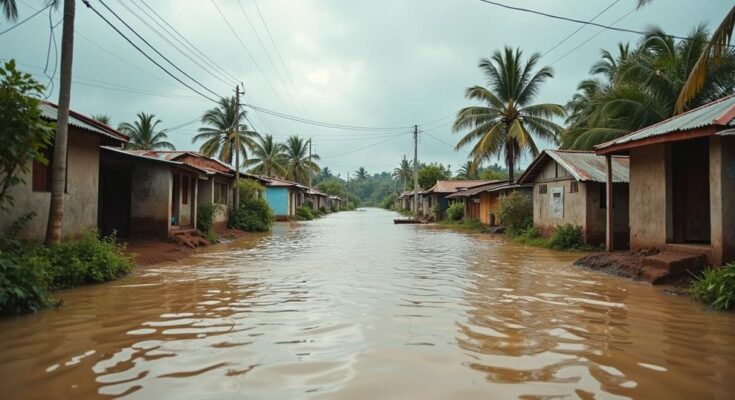Recent flooding in South Sudan has impacted 893,000 people and displaced over 241,000, according to OCHA. The floods have rendered key supply routes impassable, worsening the humanitarian crisis in a nation that is highly vulnerable to climate change. The current political situation adds to the urgency of international aid, as the government delays vital reforms and elections, amidst ongoing conflicts and economic decline.
The recent floods in South Sudan have affected approximately 893,000 individuals and displaced over 241,000 people, according to a statement released by the United Nations Office for the Coordination of Humanitarian Affairs (OCHA) on Thursday. The humanitarian situation in the world’s youngest nation is dire, with aid agencies warning that the country is experiencing its most severe flooding in decades. The heavy rainfall has rendered 15 major supply routes impassable, significantly hampering access to affected regions. OCHA further reported that the flooding has impacted 42 of the 78 counties within South Sudan, including the Abyei Administrative Area, an area of contention claimed by both South Sudan and Sudan. Notably, the northern states of Unity and Warrap account for over 40 percent of those affected by the floods. As people seek refuge on higher ground, more than 241,000 individuals have been displaced across 16 counties and the Abyei region. Since gaining independence from Sudan in 2011, South Sudan continues to grapple with persistent instability, violence, and economic challenges, compounded by climate-related disasters such as droughts and floods. An update from the World Bank noted that these recent floods exacerbate an already precarious humanitarian situation characterized by severe food insecurity, economic decline, ongoing conflict, and health crises, as well as the fallout from the recent conflict in Sudan. As of September, the ongoing conflict in Sudan has resulted in over 797,000 refugees entering South Sudan, with nearly 80 percent being South Sudanese returnees. Moreover, the political landscape remains uncertain, as the transitional government has postponed elections originally scheduled for December by an additional two years, creating a sense of frustration among the population and international observers. Key aspects of the transitional agreement, such as constitution drafting and the unification of opposing military factions, are still pending. Nicholas Haysom, the chief of the UN mission in South Sudan, expressed the growing impatience and weariness among the South Sudanese population, underscoring the need for clear indications of commitment from the country’s leaders towards a democratic trajectory. Despite the nation’s significant oil reserves, the recent damage to an export pipeline due to the conflict in Sudan has critically impacted its revenue generation. Overall, the situation presents a complex interplay of natural disasters, humanitarian crises, and political instability that must be addressed to foster a more stable and secure future for South Sudan.
South Sudan has faced numerous challenges since its independence from Sudan in 2011, plagued by a history of violence, political instability, and economic stagnation. The country is particularly vulnerable to climate change, which has led to increasing occurrences of extreme weather events such as droughts and floods. Recent floods are the worst the nation has experienced in decades and have had a devastating impact on millions of individuals, further straining an already critical humanitarian situation characterized by food insecurity and health crises. The World Bank has projected that approximately nine million people will face significant needs in 2024, underscoring the urgency of international assistance and support.
In conclusion, the flooding in South Sudan presents a catastrophic humanitarian challenge, affecting nearly 893,000 people and displacing more than 241,000 as they seek safety from rising waters. This natural disaster is exacerbating an already fragile situation,
Original Source: www.barrons.com




